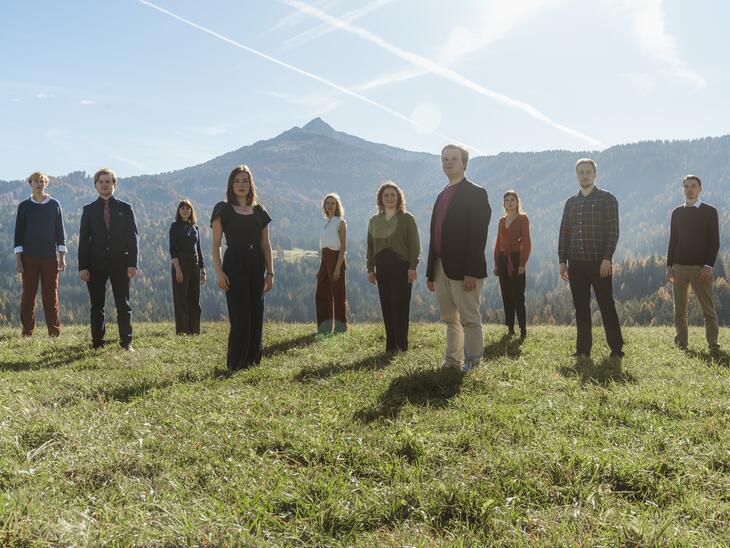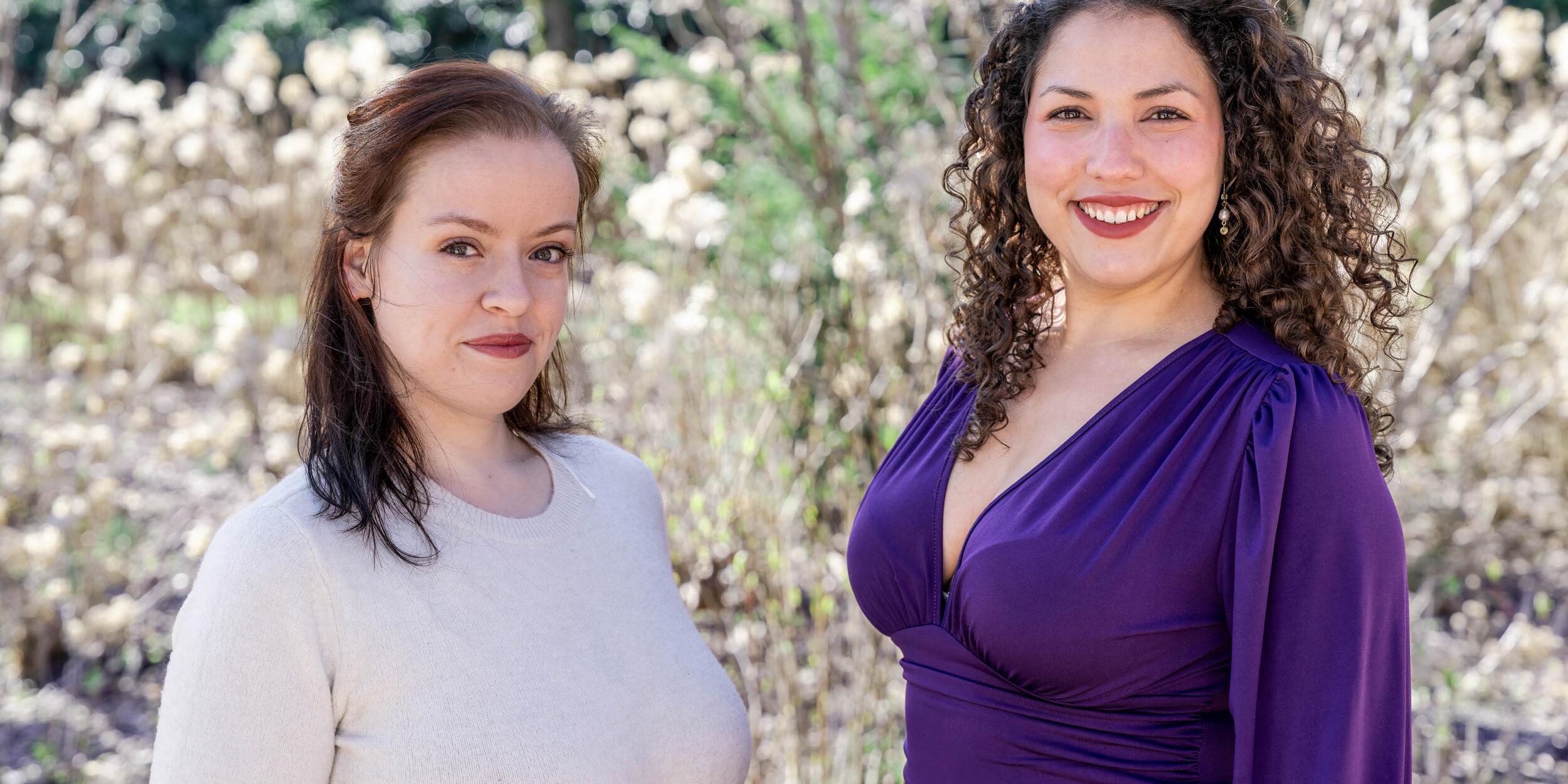
A conversation with Benedikt Gurtner about a cappella singing, working in an ensemble, the importance of music for children and society, and the social value of making music together.
International Mozart Competition - Piano: Livestream final & award ceremony on 19 February from 7 p.m.

The singers Donata Meyer-Kranixfeld and Génesis Beatriz López Da Silva provide insights into their everyday studies at the Department of Opera & Music Theatre at the University Mozarteum. A conversation about the highs and lows on the path to becoming an opera singer.
You are both preparing for your Master's degrees in Opera & Music Theatre at the end of June. What challenges still lie ahead of you?
Donata Meyer-Kranixfeld: As I have extended my Master's, I have had more time to prepare for my degree. I have learnt a lot! I would particularly like to emphasise Volker Wahl (Senior Lecturer for Music Drama), who always supports and helps wherever he can. I spent the last few semesters studying Master's Song & Oratorio at the same time, which was a particular challenge. I was able to sing many roles, all of which have different profiles - I was given the opportunity to try out, experience and show a lot.
Génesis Beatriz López Da Silva: To be honest, I didn't have a clear plan at the beginning as to when or how I would graduate. A lot of things developed over the course of my studies. It wasn't until last summer that I started thinking about what I wanted to do after my Master's degree. The most difficult thing for me in this final stage of my studies is preparing all the requirements and documents for graduation in good time, meeting all the deadlines, preparing a role at the same time and rehearsing every afternoon - that's a challenge for me!
Are there any milestones that you particularly remember during your studies or people who have had a significant influence on your development as a singer?
Donata: For me, there are three situations that I remember strongly: My very first experience on the opera stage as Fairy in Benjamin Britten's "A Midsummer Night's Dream" in the first semester of my Bachelor's degree, my first real leading role with an entire opera on my shoulders (as Governess in Britten's "The Turn of the Screw") and an experience during my second Master's degree in Lied & Oratorio: I sang the soprano part in Vaughn Williams' "A Sea Symphony" in May 2023 under the direction of Jörn Andresen. That was my first experience with a large orchestra and choir. I was able to utilise the full power of my voice in a work that now means a lot to me.
Génesis: My singing professor Juliane Banse was definitely decisive for my vocal development, and working with Alexander von Pfeil and Gernot Sahler was also an extremely enriching experience: you learn how to deal with different situations that prepare you for the theatre and "real life". The pianists from the opera department and the vocal and song department inspired me to become a better interpreter and to always ask myself how I can better express my emotions and perfect my musicality. Working with acting and physical training teachers was also intense, I learnt to pay attention to my body (and mind). Thanks to them, I feel like a holistic artist. Our professors were always there to help and support us with a positive attitude. I am incredibly grateful for all this learning.
Do you ever find that you can't get to grips with individual roles? And vice versa: is there one role that you were able to identify with immediately and where it was clear from the start how you wanted to play it?
Donata: I was able to identify best with Lucieta in Ermanno Wolf-Ferrari's "Il campiello" and the Governess in "The Turn of the Screw". Both characters struggle with their demons in very different ways. The music of both composers was very challenging for me, but once it was "in my voice", it was incredibly fun to sing it. The most difficult role - in a generally challenging production - was that of the Second Woman in "Dido & Aeneas" by Henry Purcell with the prologue and epilogue "Elissa" by Henry Fourès: It was the first time that I had sung a world premiere, the change between ensemble and role was difficult for me.
Génesis: My role as Carolina in Hans Werner Henze's "Elegy for Young Lovers" gave me a headache at first, I had never sung an atonal opera before. I had to accept that it takes a long time to get used to these harmonies. But the ensemble and the direction by Alexander von Pfeil made this production something very special for me, I learnt a lot musically and as an actor. Dorabella in Mozart's "Così fan tutte" was a challenge on a vocal and physical level; singing it felt like a three-hour marathon without a break. But the role was crucial to consolidate my vocal skills. I identified most with the character of Mrs Herring from Britten's "Albert Herring". It was easy for me to understand the character, her motivations and her body language right from the start. I was inspired by the typical "controlling Latin American mother" to give shape to this character (note: Génesis comes from Venezuela).
Even after several semesters, does everyone remain their own person as a budding artist, or do you feel a strong sense of cohesion within the opera class?
Donata: I am the link between two "generations" in my class. In the first few years, the team spirit was wonderful, you could always rely on the others and the work was always fun, no matter how strenuous it became. I think this is where Covid has really brought us together. In recent years, I've learnt to listen to myself and trust my instincts. I have colleagues who are always there for me and who I can trust blindly, especially on stage. With others, you learn professionalism and also that there will always be personalities with whom you don't get on so well.
Génesis: Everything depends on the ensemble and its dynamics. In all the productions I was involved in during my studies, the ensemble ended up being like a family. Most people look to help each other and communication almost always works well. In my experience, few people favour individuality. Personally, I feel more comfortable working in a group with a sense of belonging and unity.
How do you deal with the pressure of having to "function" on stage and deliver the best possible artistic performance, while personal animosities may be played out in the dressing room? After all, you can't choose your stage partners ... Do you feel that your studies have equipped you with the necessary interpersonal skills for such situations?
Donata: I can give a vague answer to that: Yes and no. You have to find out for yourself how not to let problems get to you and how to create a good working atmosphere. People talk everywhere, facts are passed on incorrectly, things are misunderstood, etc. But you will always find people who are great to work with and whose energy you look forward to on and off stage.
Génesis: In such cases, it helps me personally to keep a cool head and realise that I am a professional and that my goal must be to convey a message to the audience. There are always people who trust me and my work and I have to do my best. You have to learn to set boundaries and separate the personal from the professional. You don't learn these skills at university, but in practice by dealing with different people and situations.
With the roles of Alice in Verdi's "Falstaff" and Marcellina in Mozart's "Le nozze di Figaro", you are saying goodbye to your respective opera classes. Do you have plans for what comes next?
Donata: I think we all want the same thing: to be able to make a living from music. I still have a year's "grace period" due to my Master's degree. But even now it's all about auditioning, auditioning, auditioning - with agencies, competitions etc. Every person who gives feedback is one more input that can change your perspective on things.
Génesis: I currently have the honour of singing the role of Dorabella again this summer as part of the opera festival at the Stadttheater Bad Hall. After that, I have a few concerts coming up with the Gürzenich Choir Cologne, including the alto solo in Bach's Christmas Oratorio. I have also applied for the postgraduate singing programme at the Mozarteum so that I can take part in auditions and competitions at the same time. My current goal as an opera singer is to get a contract at a theatre as a member of the soloist ensemble.
(First published in the Uni-Nachrichten / Salzburger Nachrichten on 16 March 2024)